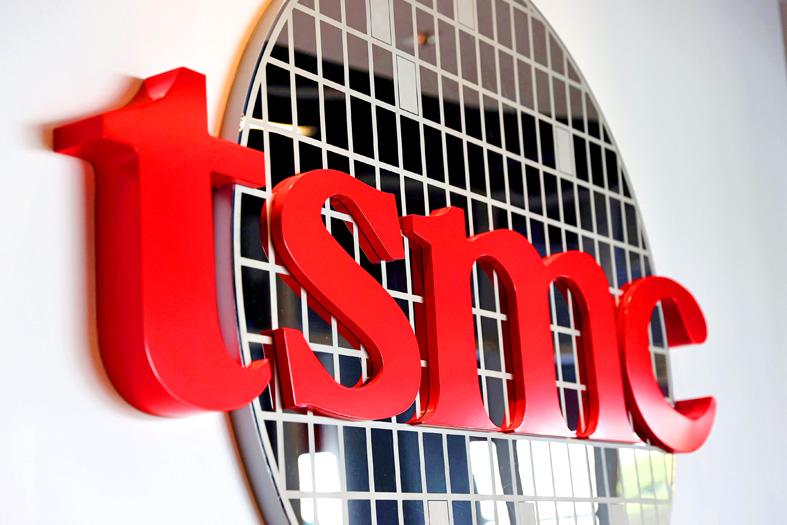Taiwan Semiconductor Manufacturing Co’s (TSMC, 台積電) shares yesterday rose 2.27 percent to the highest since Aug. 12 on media speculation that the world’s biggest chipmaker planned to hike wafer prices by up to 20 percent due to a quarters-long chip crunch and rising manufacturing costs.
The Chinese-language Economic Daily News reported that TSMC had told chip designing customers about raising prices from next quarter by 10 to 20 percent, as the chipmaker aims to maintain its gross margin, which stood at 50 percent last quarter.
The Liberty Times (sister paper of the Taipei Times) yesterday said that TSMC had upped wafer prices by 20 percent for most of its technologies, including 7-nanometer, 12-nanometer, 28-nanometer and 40-nanometer technologies.

Photo: Ann Wang, Reuters
The new prices took effect immediately after customers received the notifications at noon yesterday, the report said.
TSMC and MediaTek Inc (聯發科), one of TSMC’s top clients, could not be reached for comment as of press time last night.
TSMC has been reluctant to raise prices even though its peers, such as United Microelectronics Corp (UMC, 聯電), increased prices on new orders by 10 percent or more early this year amid drastic increases in manufacturing costs.
Responding to investors’ concerns over its pricing strategy, TSMC chief executive officer C.C. Wei (魏哲家) last month said that the “company’s pricing strategy is strategic, and we don’t take an opportunistic approach.”
“We work with our customers closely and we want to help them to be successful while we get a proper return,” Wei said. “So that’s why we are firming up our wafer pricing, and we are confident that we can keep our gross margin at 50 percent or above in the long term.”
A short-term imbalance in the supply chain, driven by a need to ensure supply security, and the structural increases entailed by long-term demand are expected to persist, the Hsinchu-based company said earlier.
TSMC’s capacity would remain tight through next year, fueled by increasing demand for its advanced technologies and specialty technologies used in 5G devices and applications of high-performance computing, it said.
The COVID-19 pandemic has fundamentally accelerated a digital transformation, making semiconductors more pervasive and essential in people’s lives, it added.
TSMC shares have rallied 9.14 percent this year, closing at NT$585 yesterday in Taipei trading.

In his National Day Rally speech on Sunday, Singaporean Prime Minister Lawrence Wong (黃循財) quoted the Taiwanese song One Small Umbrella (一支小雨傘) to describe his nation’s situation. Wong’s use of such a song shows Singapore’s familiarity with Taiwan’s culture and is a perfect reflection of exchanges between the two nations, Representative to Singapore Tung Chen-yuan (童振源) said yesterday in a post on Facebook. Wong quoted the song, saying: “As the rain gets heavier, I will take care of you, and you,” in Mandarin, using it as a metaphor for Singaporeans coming together to face challenges. Other Singaporean politicians have also used Taiwanese songs

NORTHERN STRIKE: Taiwanese military personnel have been training ‘in strategic and tactical battle operations’ in Michigan, a former US diplomat said More than 500 Taiwanese troops participated in this year’s Northern Strike military exercise held at Lake Michigan by the US, a Pentagon-run news outlet reported yesterday. The Michigan National Guard-sponsored drill involved 7,500 military personnel from 36 nations and territories around the world, the Stars and Stripes said. This year’s edition of Northern Strike, which concluded on Sunday, simulated a war in the Indo-Pacific region in a departure from its traditional European focus, it said. The change indicated a greater shift in the US armed forces’ attention to a potential conflict in Asia, it added. Citing a briefing by a Michigan National Guard senior

CHIPMAKING INVESTMENT: J.W. Kuo told legislators that Department of Investment Review approval would be needed were Washington to seek a TSMC board seat Minister of Economic Affairs J.W. Kuo (郭智輝) yesterday said he received information about a possible US government investment in Taiwan Semiconductor Manufacturing Co (TSMC, 台積電) and an assessment of the possible effect on the firm requires further discussion. If the US were to invest in TSMC, the plan would need to be reviewed by the Department of Investment Review, Kuo told reporters ahead of a hearing of the legislature’s Economics Committee. Kuo’s remarks came after US Secretary of Commerce Howard Lutnick on Tuesday said that the US government is looking into the federal government taking equity stakes in computer chip manufacturers that

CLAMPING DOWN: At the preliminary stage on Jan. 1 next year, only core personnel of the military, the civil service and public schools would be subject to inspections Regular checks are to be conducted from next year to clamp down on military personnel, civil servants and public-school teachers with Chinese citizenship or Chinese household registration, the Mainland Affairs Council (MAC) said yesterday. Article 9-1 of the Act Governing Relations Between the People of the Taiwan Area and the Mainland Area (臺灣地區與大陸地區人民關係條例) stipulates that Taiwanese who obtain Chinese household registration or a Chinese passport would be deprived of their Taiwanese citizenship and lose their right to work in the military, public service or public schools, it said. To identify and prevent the illegal employment of holders of Chinese ID cards or